
Working with interdisciplinary teams and nurse navigators to coordinate care across specialties is a facet of oncology nursing that may be overlooked, says an expert.

Working with interdisciplinary teams and nurse navigators to coordinate care across specialties is a facet of oncology nursing that may be overlooked, says an expert.
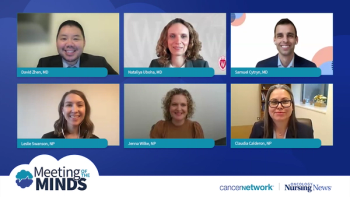
Experts discuss how to balance treatment intensity with maintaining quality of life, particularly in patients with advanced-stage disease.

Experts discuss effective communication strategies for managing patient and caregiver expectations about treatment adverse effects and their potential impact on daily life.
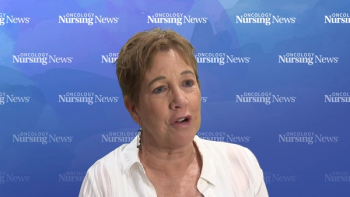
Patricia Jakel, MN, RN, AOCN, emphasized that the bond oncology nurses have with patients with cancer necessitates honest and often difficult conversations.

Key opinion leaders compare lorlatinib’s side effect profile to other ALK inhibitors, highlighting unique challenges and benefits observed in clinical practice.

Key opinion leaders discuss effective multidisciplinary strategies for managing the range of side effects associated with ALK inhibitors.

Jessie Desir, PhD, RN, AMB-BC, OCN, discussed the need for awareness about cancer subtypes and their prevalence in certain populations.

Staying up to date with data from trials and information from organizations dedicated to cancer research is crucial for oncology nurses and APPs.

Experts discuss the role of supportive therapies, such as antiemetics, nutritional support, and physical activity, in improving outcomes and patient comfort during treatment.

Key opinion leaders explore approaches to dose modifications or treatment pauses due to side effects, including examples where these adjustments significantly impacted patient outcomes.

Key opinion leaders examine how to manage gastrointestinal side effects in patients on lorlatinib, including preventive tips and comparisons with GI management strategies for other ALK inhibitors.

Experts discuss the most common adverse events associated with the FOLFOX regimen and effective strategies for early detection and management.

Experts discuss Robert’s journey with HER2- upper gastrointestinal (GI) cancer, highlighting key treatment approaches and challenges.

Key opinion leaders discuss experiences managing weight gain with lorlatinib, addressing its impact on quality of life versus treatment benefits.

Experts discuss key immune-related adverse events (irAEs) to monitor in patients receiving nivolumab, how to differentiate these from disease-related symptoms, and how to manage moderate to severe irAEs, including factors that determine whether immunotherapy should be paused or discontinued.

Key opinion leaders explore strategies for managing neurotoxicity in patients on ALK inhibitors, emphasizing monitoring practices and balancing symptom management with treatment efficacy.

Panelists discuss how emerging treatments, digital health tools, and enhanced care coordination could streamline disease management and improve quality of life while identifying opportunities to strengthen provider communication and access to resources.

Panelists discuss how their lived experiences and insights as patients should inform research priorities, treatment development, and care delivery improvements while sharing hopes for a future cure that would eliminate ongoing disease management needs and allow greater life flexibility.

Panelists discuss how they maintain treatment adherence through digital health apps, calendar reminders, and symptom journals while working closely with their care teams to address uncertainties and make informed decisions about therapy adjustments, with crucial support from caregivers who help track appointments and provide emotional encouragement throughout their chronic care journey.

Panelists discuss how they navigated initial treatment confusion by seeking clarification from healthcare providers, consulting patient resources, and connecting with support groups to better understand their care journey.
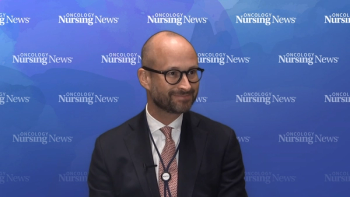
Axel Stuart Merseburger, MD, PhD, explained that with TKIs like axitinib, it is necessary for oncology nurses to spend time with each patient to provide the best care.
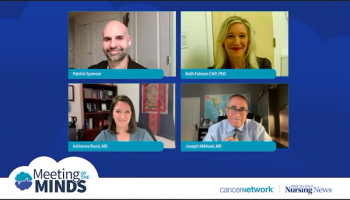
The conversation explores strategies for collaboration between academic centers and community practices in delivering optimal long-term care for CAR-T patients, highlighting useful resources for community oncologists and approaches to managing referrals for follow-up care.

The discussion focuses on essential components of patient education and support for long-term CAR-T survivors, addressing strategies to sustain quality of life, manage late therapy effects, and meet the distinct long-term care needs of ide-cel and cilta-cel recipients.
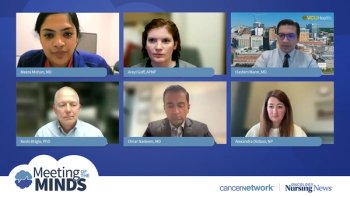
Dr Mohan engages with Dr Mann, Nurse Brigle, Nurse Distaso, and Dr Nadeem to explore challenges in the referral process for bispecific therapy, including local health care barriers, and strategies for ensuring consistent patient education and support when care is shared between community and academic centers.
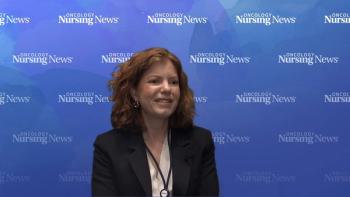
Katy Beckermann, MD, PhD, explained that oncology nurses and APPs should be ready to administer and explain dose modifications for patients with RCC.
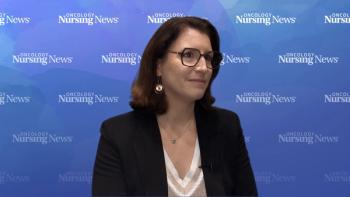
According to Laurence Albiges, MD, PhD, treatment of RCC with cabozantinib, nivolumab, and ipilimumab can cause potentially serious toxicities that should be closely monitored.

Key opinion leaders focus on educating patients about potential side effects of lorlatinib and other ALK inhibitors, including guidance on when to contact their care team.
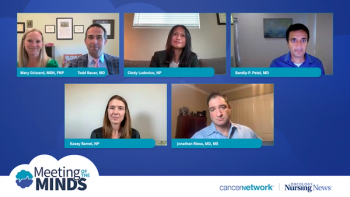
Medical experts provide their final insights surrounding quality of life amid treatment for metastatic non-small cell lung cancer.

This is an actor portrayal of a hypothetical patient profile developed for educational purposes based on characteristics of patients with ALK+ non-small cell lung cancer as seen in clinical practice. The hypothetical case was co-developed by staff Medical Writers with Cancer Network/ONN

Medical experts discuss strategies for managing adverse events associated with KRAS-targeted therapies, addressing monitoring challenges with oral medications and balancing symptom management with treatment efficacy.